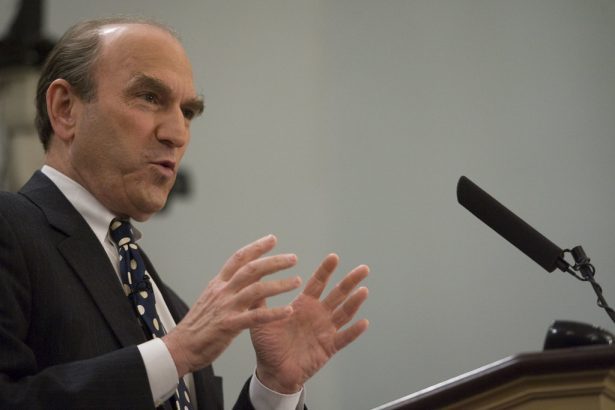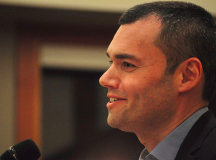Elliott Abrams casts a sharply critical eye over the American Jewish anti-Zionism and diasporism of Peter Beinart, Naomi Klein and others. In October, Abrams will publish a new book, ‘If You Will It’.
Most American Jews have watched with disgust as the United Nations system—the General Assembly, the International Court of Justice, the International Criminal Court—attacks the State of Israel week after week. The delegitimisation campaign is today in full swing, joined most recently by three European states that recognised the non-existent ‘State of Palestine.’ And this Spring has also brought horrifying displays of antisemitism and anti-Zionism on U.S. college campuses.
The reaction of many American Jews has been to express greater solidarity with Israel—by visiting there, marching and protesting, or making donations to Jewish organisations. American Jews are finding one way or another of showing up, to express solidarity with their people and with the Jewish State.
But not all. Some are deserting. Their position goes far beyond criticism of the current Israeli war cabinet, or of Prime Minister Netanyahu. It is an abandonment of their own people; the going got tough, so they got going—out the door.
These people are anti-Zionists who want to break the ties between Jews, Judaism, and the Jewish State. They’ve been around for a long time, with varied motivations, but their re-emergence right now is a moral crime.
Natan Sharansky and Gil Troy saw it coming, writing in 2021 that ‘The anti-Zionists know exactly what they are doing, and what they are undoing. They are trying to disentangle Judaism from Jewish nationalism, the sense of Jewish peoplehood, while undoing decades of identity-building.’ In fact the anti-Zionists are protesting what they sometimes call the ‘conflation of Israel with the Jewish people.’ And of course they are never alone. As Sharansky and Troy wrote, ‘The voices of inflamed Jewish opponents of Israel and Zionism are in turn amplified by a militant progressive superstructure that now has an ideological lock on the discourse in American academia, publishing, media, and the professions that formerly respected American Jewry’s Zionism-accented, peoplehood-centred constructions of Jewish identity.’
In some ways this is an old story. As soon as Zionism was invented, anti-Zionism was invented. It was mostly religious: the view that hastening the return to Zion was substituting human will for God’s, was indeed rebellion against God; God sent the Jews into exile and the messianic age would arrive when He decided. That view was largely destroyed by the Holocaust and the need for a refuge in the Jewish State. It lingers on in the views of the Satmar Hasidim and of Neturei Karta—whose positions on Israel are precisely what one now hears from the far Left. The Satmar Rabbi Aaron Teitelbaum said in 2018 that ‘We have no part in Zionism. We have no part in their wars. We have no part in the State of Israel.’
Three weeks after the 7 October massacre, Neturei Karta spokesman Rabbi Yisroel David Weiss said ‘We are crying with the Palestinians.’ He went on: ‘Judaism and Zionism are as different from each other as the earth and the sky; they contradict each other … As devout Jews, we pray to God every day for the swift removal of the Zionist state of Israel, which has caused so much bloodshed among Palestinians and Jews. We pray to God for the speedy liberation of Palestine.’
Twenty years ago, as a White House official I met with Palestinian Authority President Mahmoud Abbas in his residence in Amman, Jordan. He took me to his private office for a quiet talk, and that room was decorated with only two photographs. One was of Yasser Arafat. The other showed Abbas receiving an award from the rabbis leading Neturei Karta.
Today we hear the same sort of language from the Left. We hear it, of course, in the eliminationist chants on college campuses: ‘From the river to the sea, Palestine will be free.’ We hear it from ‘progressives’ like the author Naomi Klein, who is ‘Professor of Climate Justice’ at the University of British Columbia. Klein’s Passover message in the Guardian newspaper was that ‘We need an exodus from Zionism … too many of our people are worshipping a false idol once again … that takes our most profound biblical stories of justice and emancipation from slavery – the story of Passover itself – and turns them into brutalist weapons of colonial land theft, roadmaps for ethnic cleansing and genocide.’
This is Diasporism—the view that the creation of the State of Israel, and the entire Zionist movement, was a ghastly mistake and that Jewish life is best led in exile. ‘Zionism has brought us to our present moment of cataclysm and it is time that we said clearly: it has always been leading us here,’ Klein wrote. It’s an important point: her objection is not to one policy or one leader; as she also wrote, ‘it’s not just Netanyahu, it’s the world he made and that made him – it’s Zionism.’ The only remedy is for Jews to separate from, as the Iranian regime calls it, the ‘Zionist entity.’
There are numerous versions of this heresy; Peter Beinart has gained a modicum of fame and a great deal of infamy pushing his. He starts by abandoning both Israel and the two-state solution: ‘The painful truth is that the project to which liberal Zionists like myself have devoted ourselves for decades—a state for Palestinians separated from a state for Jews—has failed. The traditional two-state solution no longer offers a compelling alternative to Israel’s current path. It risks becoming, instead, a way of camouflaging and enabling that path.’
His suggested alternative to the terrible existing Israel is a binational state. Put more clearly, the Jewish State we have known since 1948 must end: ‘It is time for liberal Zionists to abandon the goal of Jewish–Palestinian separation and embrace the goal of Jewish–Palestinian equality.’ His rhetorical trick is to claim that he’s still a Zionist, a ‘liberal Zionist,’ but Zionism doesn’t require a state—just a ‘homeland.’ Thus he claims that ‘The essence of Zionism is not a Jewish state in the land of Israel; it is a Jewish home in the land of Israel…’ He therefore calls upon Jews to ‘explore other ways to achieve that goal—from confederation to a democratic binational state—that don’t require subjugating another people. It’s time to envision a Jewish home that is a Palestinian home, too.’
A Jewish ‘home in the land of Israel’ was once the goal of many in the Zionist movement, until the rise of the Nazis, the Second World War, and the Holocaust. The 1942 Biltmore Conference of American Jewish leaders, held in New York City, marked the change from half-hearted support for Zionist goals, to focus on a state rather than an amorphous ‘homeland.’ As the historian of Zionism Melvin Urofsky put it, ‘Before Biltmore, American Zionists saw Palestine as a refuge; after Biltmore they fought for a state…’
Citing Nazi persecution and ‘Jewish homelessness,’ the Conference demanded ‘that the gates of Palestine be opened; that the Jewish Agency be vested with control of immigration into Palestine and with the necessary authority for upbuilding the country, including the development of its unoccupied and uncultivated lands; and that Palestine be established as a Jewish Commonwealth.’ Moreover, the Declaration called for ‘a Jewish military force fighting under its own flag…’ By 1942, then, the American Jewish community was Zionist—if being a Zionist is defined as calling for a Jewish state in Palestine.
It is precisely this decision that the anti-Zionist Diasporists wish to reverse. Klein, Beinart, and all the rest of them must know how many ‘democratic binational states’ there are in the Middle East—none. They must know what a ‘confederation’ with a Palestinian society that widely supports Hamas would mean. Why, then, do they pursue the argument?
In the deepest sense, the Leftist anti-Zionists are adopting the view of the Satmar and Neturei Karta: a Jewish State cannot exist until the Messianic Age arrives because the one we have, built by men and women, is not pure enough. As Andre Spokoiny rightly described their view, ‘By virtue of their powerlessness, Jews could become the conscience of the world, the ultimate parameter of the morality of a human society. By sustaining a romance with powerlessness, and an idealisation of the lack of agency that transforms tragedy into virtue, Jewish vulnerability in the Diaspora could be reimagined as the ultimate engine of Jewish moral and intellectual genius….’ The moral blindness inherent in this view is well depicted in this vignette Spokoiny recounted: ‘Imre Kertész, winner of the Nobel Prize for Literature, synthesised better the bargain that Jews needed to make. During a visit to Israel, a foreign journalist, aware of Kertész’s humanist and pacifist leanings, asked him, ‘How does it feel for you to see a Star of David on a tank?’ ‘Much better than seeing it on my concentration camp uniform,’ he answered.’
Of course, the anti-Zionists do not demand that purity of any other state, including the United States or Canada or any other Western democracy. Only the Jewish State must operate beyond the demands of statecraft and of realpolitik; and the fact that it has been surrounded since its birth by states and terrorist groups determined to extinguish its existence is to them irrelevant. As Yossi Shain put it, ‘the hope that a state, which must always operate under raison d’état, might successfully operate by universal and non-territorial principles was doomed to failure—especially in the jungle that is the Middle East.’ But the anti-Zionists do not accept this as their own moral and political failure; to them, it is Israel that has failed, not their impossible demands of it.
As Spokoiny wrote, ‘Anti-Zionists … see nothing wrong in Palestinians exercising political power in the context of a Palestinian national state and even oppressing Jews—or killing them. It’s Jewish power that bothers them … That their supposed moral excellence is acquired by trading on the bodies of dead Jews doesn’t bother them, since they’ve established that playing the victim is by definition a morally superior posture. Jews need to be oppressed to produce their best.’
‘The anti-Zionism of powerlessness,’ Spokoiny added, ‘is deeply cowardly. It avoids the real challenges of power, its messiness, its insolvable moral dilemmas, and its endless shades of gray. Diasporism is a facile escape, for which someone else is expected to pay the tab.’ And that someone else is of course Israeli Jews. The Diasporists are engaged in what he rightly calls ‘a morally criminal act.’
This is the culmination of a challenge that American Jews on the Left have faced for decades—indeed since 1948. As the historian Naomi Cohen wrote, ‘Zionists projected their American liberal values onto their ideal Jewish state … Envisioning Israel as an ideological extension of American liberalism was an obvious reinforcement of both American and American Jewish commitment to the Jewish state.’ That worked for a while: Jerold Auerbach explained that ‘By 1948, for American Jews, liberalism and Judaism were ideologically indistinguishable.’ But the seeds of the current problem were there, he said: ‘The latent quandary of American Jews was rooted in their resolute identification of Judaism with liberalism….’ Because as Naomi Cohen wrote, ‘were Israel to deviate from the accepted canons of liberalism, it ran the risk of alienating American Jewish support.’
The ‘accepted canons of liberalism’ are changing; we have seen the many efforts to redefine them on American campuses since 7 October. No doubt this was a joyous moment for many Leftist Jews, as they watched tent encampments built, classes disrupted, and Israel defamed. But for other American Jews, not quite so far left, it was no doubt painful. Among Jewish students themselves, many had to choose between supporting the Jewish State and the Jewish people—or being ostracised by former friends, excluded from clubs and cliques they had happily joined, and even facing physical danger.
We still do not know how a generation of Jews will choose, even though we have seen many examples of moral courage among young American Jews. Their parents have not faced a similar test, and even in moments of victory and celebration the attachment to Israel of those older generations has often been weak. As Jerold Auerbach reminded us, ‘For a decade after that momentous week in June [1967], American Jews basked in the glow of their new identification. Israel, for so long a source of American Jewish uneasiness or indifference, suddenly became a tangible symbol of Jewish pride and power, even the new religion of American Jews. Yet what is remarkable in retrospect is the brevity of the attachment.’
But those generations did not face quite the test now before younger American Jews. The Diasporists, arguing for the purity of exile and powerlessness, and demanding abandonment of the now-impure Jewish State, are disguising a moral crime as an act of enlightenment. Yossi Klein Halevi set forth the blessing and the curse:
To be against Zionism before the Holocaust and 1948 was wrong, tragically so, but honest. It was not siding against your own people. Today Israel is under attack, delegitimizing not just Zionism religiously but Israel entirely—under assault as colonialist and racist and especially, uniquely evil. We see this right now—ICC, UNHRC, etc.
At this moment to abandon it, as the anti-Zionist ‘diasporists’ argue, is not to propose a positive, creative Jewishness. It is to abandon your people when they are under attack. It is to place yourself outside. It is the equivalent morally of saying in the 1930s that you were not really Jewish, or were Jewish by blood but were really a nationalist, a patriot. It is to separate yourself from your people’s fate.
This can be done in the United States, and we have indeed been watching the young American Jews who helped build those campus tent cities and joined the denunciations of the Jewish State do it—following the lead and the guidance of the Naomi Kleins and the Peter Beinarts and the hundreds of Jewish professors who wish to proclaim their virtue by lining up against the Jewish State. Whether they will in the end seduce a significant portion of the next American Jewish generation or only a small and marginal group remains to be seen.
The American Zionist movement dates back to the end of the 19th century and the Zionist consensus dates back over 80 years. The anti-Zionist efforts now underway to shred it are the most energetic, the best financed, and the most dangerous American Jews have experienced. In the current Gaza war we are seeing the younger generation of Israelis act with courage and determination to save the Jewish State—to save the Zionist Entity, if you will. Will younger American Jews see a model for how to live as a Jew and a moral human being in their behaviour—or in the siren song of the Left as it maneuvers to undermine the Jewish people and the Jewish State?




































